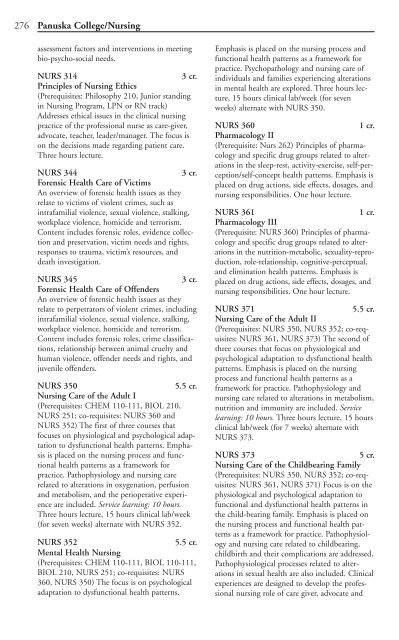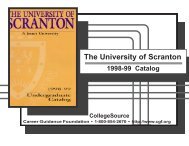2003-2004 - The University of Scranton
2003-2004 - The University of Scranton
2003-2004 - The University of Scranton
You also want an ePaper? Increase the reach of your titles
YUMPU automatically turns print PDFs into web optimized ePapers that Google loves.
276 Panuska College/Nursing<br />
assessment factors and interventions in meeting<br />
bio-psycho-social needs.<br />
NURS 314 3 cr.<br />
Principles <strong>of</strong> Nursing Ethics<br />
(Prerequisites: Philosophy 210, Junior standing<br />
in Nursing Program, LPN or RN track)<br />
Addresses ethical issues in the clinical nursing<br />
practice <strong>of</strong> the pr<strong>of</strong>essional nurse as care-giver,<br />
advocate, teacher, leader/manager. <strong>The</strong> focus is<br />
on the decisions made regarding patient care.<br />
Three hours lecture.<br />
NURS 344 3 cr.<br />
Forensic Health Care <strong>of</strong> Victims<br />
An overview <strong>of</strong> forensic health issues as they<br />
relate to victims <strong>of</strong> violent crimes, such as<br />
intrafamilial violence, sexual violence, stalking,<br />
workplace violence, homicide and terrorism.<br />
Content includes forensic roles, evidence collection<br />
and preservation, victim needs and rights,<br />
responses to trauma, victim’s resources, and<br />
death investigation.<br />
NURS 345 3 cr.<br />
Forensic Health Care <strong>of</strong> Offenders<br />
An overview <strong>of</strong> forensic health issues as they<br />
relate to perpetrators <strong>of</strong> violent crimes, including<br />
intrafamilial violence, sexual violence, stalking,<br />
workplace violence, homicide and terrorism.<br />
Content includes forensic roles, crime classifications,<br />
relationship between animal cruelty and<br />
human violence, <strong>of</strong>fender needs and rights, and<br />
juvenile <strong>of</strong>fenders.<br />
NURS 350 5.5 cr.<br />
Nursing Care <strong>of</strong> the Adult I<br />
(Prerequisites: CHEM 110-111, BIOL 210,<br />
NURS 251; co-requisites: NURS 360 and<br />
NURS 352) <strong>The</strong> first <strong>of</strong> three courses that<br />
focuses on physiological and psychological adaptation<br />
to dysfunctional health patterns. Emphasis<br />
is placed on the nursing process and functional<br />
health patterns as a framework for<br />
practice. Pathophysiology and nursing care<br />
related to alterations in oxygenation, perfusion<br />
and metabolism, and the perioperative experience<br />
are included. Service learning: 10 hours.<br />
Three hours lecture, 15 hours clinical lab/week<br />
(for seven weeks) alternate with NURS 352.<br />
NURS 352 5.5 cr.<br />
Mental Health Nursing<br />
(Prerequisites: CHEM 110-111, BIOL 110-111,<br />
BIOL 210, NURS 251; co-requisites: NURS<br />
360, NURS 350) <strong>The</strong> focus is on psychological<br />
adaptation to dysfunctional health patterns.<br />
Emphasis is placed on the nursing process and<br />
functional health patterns as a framework for<br />
practice. Psychopathology and nursing care <strong>of</strong><br />
individuals and families experiencing alterations<br />
in mental health are explored. Three hours lecture,<br />
15 hours clinical lab/week (for seven<br />
weeks) alternate with NURS 350.<br />
NURS 360 1 cr.<br />
Pharmacology II<br />
(Prerequisite: Nurs 262) Principles <strong>of</strong> pharmacology<br />
and specific drug groups related to alterations<br />
in the sleep-rest, activity-exercise, self-perception/self-concept<br />
health patterns. Emphasis is<br />
placed on drug actions, side effects, dosages, and<br />
nursing responsibilities. One hour lecture.<br />
NURS 361 1 cr.<br />
Pharmacology III<br />
(Prerequisite: NURS 360) Principles <strong>of</strong> pharmacology<br />
and specific drug groups related to alterations<br />
in the nutrition-metabolic, sexuality-reproduction,<br />
role-relationship, cognitive-perceptual,<br />
and elimination health patterns. Emphasis is<br />
placed on drug actions, side effects, dosages, and<br />
nursing responsibilities. One hour lecture.<br />
NURS 371 5.5 cr.<br />
Nursing Care <strong>of</strong> the Adult II<br />
(Prerequisites: NURS 350, NURS 352; co-requisites:<br />
NURS 361, NURS 373) <strong>The</strong> second <strong>of</strong><br />
three courses that focus on physiological and<br />
psychological adaptation to dysfunctional health<br />
patterns. Emphasis is placed on the nursing<br />
process and functional health patterns as a<br />
framework for practice. Pathophysiology and<br />
nursing care related to alterations in metabolism,<br />
nutrition and immunity are included. Service<br />
learning: 10 hours. Three hours lecture, 15 hours<br />
clinical lab/week (for 7 weeks) alternate with<br />
NURS 373.<br />
NURS 373 5 cr.<br />
Nursing Care <strong>of</strong> the Childbearing Family<br />
(Prerequisites: NURS 350, NURS 352; co-requisites:<br />
NURS 361, NURS 371) Focus is on the<br />
physiological and psychological adaptation to<br />
functional and dysfunctional health patterns in<br />
the child-bearing family. Emphasis is placed on<br />
the nursing process and functional health patterns<br />
as a framework for practice. Pathophysiology<br />
and nursing care related to childbearing,<br />
childbirth and their complications are addressed.<br />
Pathophysiological processes related to alterations<br />
in sexual health are also included. Clinical<br />
experiences are designed to develop the pr<strong>of</strong>essional<br />
nursing role <strong>of</strong> care giver, advocate and
















